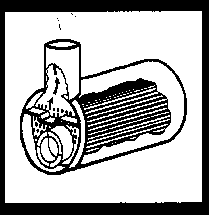MACT Update
New MACT for Boilers Under Development
A Maximum Achievable Control Technology (MACT) standard will be
proposed in November 1999 for industrial combustion sources, including
boilers, process heaters, stationary turbines, and stationary internal
combustion engines. The standard will be
 promulgated
in November 2000.
promulgated
in November 2000.
Through a coordinating committee of stakeholder representatives and several work groups, the Industrial Combustion Coordinated Rulemaking (ICCR) Committee will develop recommendations for the various combustion source categories and pollutants (hazardous air pollutants and criteria pollutants).
Recently, the Pollution Prevention Subgroup recommended several "Good Combustion Practices" for consideration by the Coordinating Committee. Some of these recommendations include: official documented operating and maintenance procedures; monitor fuel/waste quality; continuous or periodic monitoring to adjust air distribution and fuel/waste dispersion; and procedures in place to ensure adequate atomization and mixing with combustion air. These recommendations identify possible ways the work groups could incorporate requirements for good combustion practices into regulatory recommendations. However, they may not be applicable to all combustion sources and will require evaluation by the different source work groups.
For more information about the ICCR, contact Kim Davis, Division of Air Quality, at (919) 733-1478, or visit the EPA's information site.
MACT Standards Proposed
The EPA’s Office of Air Quality Planning and Standards is continuing to develop new Maximum Achievable Control Technology (MACT) standards for several source categories. MACT is required by Title III of the 1990 Clean Air Act and is based on maximum available control technology for major sources of hazardous air pollutants.
The table to the right is a partial list of affected source categories and their corresponding promulgation dates. For additional information, contact Joelle Burleson, N.C. Division of Air Quality, at (919) 733-1474. For a complete listing of MACT’s, consult EPA’s web page.
Categories
Proposed
Promulgated
Asphalt Concrete Manufacturing
11/99
11/00
Auto & Light Duty Truck Coating
11/99
11/00
Boat Manufacturing
12/99
12/00
Dry Cleaning
11/99
11/00
Ethylene Processes
11/98
11/99
Flexible Foam Manufacturing
12/96
1/98
Municipal Landfills
11/99
11/00
Paint Strippers
11/99
11/00
Pharmaceuticals Production
3/97
4/98
Plastic Parts & Products
11/99
11/00
Plywood/Particle Board Manuf.
11/99
11/00
Portland Cement
12/97
9/98
Printing, Coating, & Dyeing of Fabrics
11/99
11/00
Publicly Owned Treatment Works
2/98
1/99
Reinforced Plastic Composites Prod.
12/98
2/00
Rubber Tire Production
3/99
12/99
Semiconductor Manufacturing
11/99
11/00
Sewage Sludge Incinerators
4/99
5/00
Site Remediation
11/99
11/00